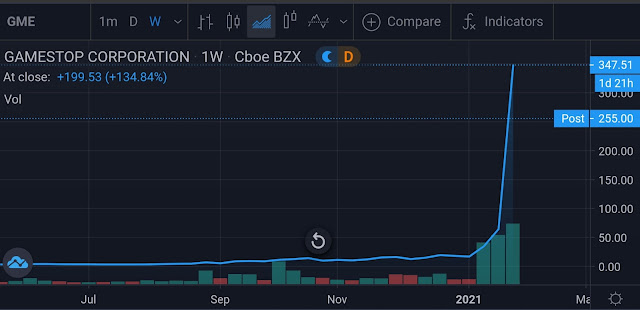GameStop fiasco: The markets of manipulation and their collective activism.
Elon Musk, now close to being a trillionare if the Tesla
share price continues to rally, whose Twitter conspiracy theory ramblings on
COVID-19 and the lockdowns was enough to go by, it is his strange libertarian
anti authoritarian/free market crusader and general obstinate antagonism that is
also, in a more serious note, attuned to insider manipulation and game playing
with the Security and Exchange Commission (SEC), not to mention the various
Hedge Funds - via his rapid fire Tweets, in an attempt at sending stock his
company stock prices upward. Is at it again, not so much with his over hyped electrical car company which is true, it
is dying to be short sold (betting against the stock price) by a slew of hedge fund managers, but this time a retail chain called GameStop that sells
video games, which got hit hard by the pandemic – when retail shifted to online
buying. Attaching a link from his Tweet to the Reddit forum with the word
“Gamestonk!” written in the tweet, Musk sent the stock soring contributing to a
proxy battle by what is now known as “herd” investors on the community forum
Reddit, to take on Wall Street's Hedge Fund giants, who have amassed millions
of dollars in short selling positions against the GameStop stock, coded GME on
the Nasdaq. The stock traded at $19.95
on the 12th
January 2021, it has since rallied over
134% from its low, closing at a high of $347 on 27th January. This parabolic rise,
particularly when it was inflamed by Musk's recent tweet, in the last five days
of trading before the the 27th market close, has risen 500%.
This collective buying of a stock that has all the
hallmarks of market manipulation, is unique in the sense that it is mostly
aimed at encouraging gullible retail investors, who have gathered on the Reddit
'GameStop' forum, to buy into what appears as a flurry of anonymous posts that
the stock will keep going higher, to
continue buying and that it is a moral
battle between the small retail investor and the institutional broker. It of course whiffs of an inside confidence
play, that admittedly has short squeezed out the Hedge Funds who had positions
against the rising stock price, have lost, so far, over $6 billion. This buying and trading stocks for the
amateur investor has never been easier, with trading apps abundant, it is the
app RobinHood that is the most utilized as a platform to instantly buy and sell
stocks via the various indexes. However, the big difference between volume buys and volume participants in the market has never been so obvious, largely because of smart phone trading and now, seemingly the en masse collectivism of amateur investors.
In December 2020, short positions were lining up to bet against Musk's Tesla electrical car company, encouraged, once again on Twitter, by the famed Hedge Fund manager Micheal Burry, whose persona appeared in the movie the “Big Short” documenting his famous short positions on US banks when the American housing market crashed in 2008. At a constant headache for the SEC, these Twitter back and forth antagonizing plays between hedge fund managers and Musk, it was Burry's claim that Tesla was overvalued and that there was not enough “diluting” of its share price by the issuing of more Tesla shares. Rather Musk, in Burry's opinion, was deliberately allowing an overvalued share price, with its buying speculation through the scarcity of share issues, revealing in the same Twitter link to a spread sheet that showed Tesla's profit margins and revenue were narrow thin – which did not justified Tesla's inflated market cap. Yet, with the Federal Reserve holding over $7 Trillion in its bond buying program, when it added $2.3 Trillion in April 2020, in an effort to rabidly expand credit to business and households amidst a global pandemic, while reducing interest rates close to 0% for anyone holding US dollars and US Tresurues (UST), it was the 10 year UST that ended up, historically, in 2020 dipping close to negative interest. So it should be no surprise that speculation revved up like a freight train and so did the stock market, with billions pouring out of so called safe havens, like bonds and cash they ended in an already overvalued stock market to rally on the back of the Central Bank's massive intervention. Tesla, rallied in tandem, forcing a many funds to close short positions throughout out 2020 and buy into the rally, yet Burry's bearish call at the end of the year remains, as does his positions against the share price. Is there writing on the wall for a massive sell off of not just Tesla but the entire stock market? Could the feverish buying of GameStop be a prelude to a market crash?
The GameStop fiasco and its collective idealisms of taking on Wall Street and the funds that make money from a market that either goes up or goes down, hence what a Hedge Fund does hedging on both directions, could be a veiled last gasp of the poor retail investor caught in a spin cycle of activism hype, that by its intention are to fleece you out of money or use that wayward thought that you, as an amateur investor, could even-the-score against those greedy institutional investors who still have an abundance of cheap money to play with. You don't. Yes, greed swings both ways as is its cause and effect, but its rise and fall are not always equal.


Comments
Post a Comment